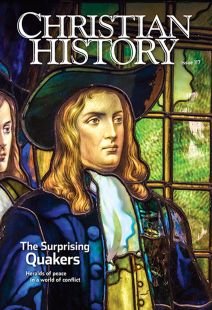Christian History Timeline: The Surprising Quakers
— 1649 Parliament beheads King Charles I in a political and religious dispute. During the turmoil of the next 11 years, many dissident religious groups form and dissolve.
— 1652 Quaker founder George Fox has a vision while on Pendle Hill in northwest England of “a great people to be gathered.” People are drawn to Fox’s straightforward message, based on his extensive biblical knowledge and intense personal experience of the presence of God in his life.
— 1655 Margaret Fell (later Margaret Fox) adds her organizational genius to the Quaker movement.
— 1660 The monarchy regains control as Charles II, son of Charles I, becomes king of England. The new government suspects all religious dissenters of political intrigue. Parliament passes laws banning gatherings and religious activity not authorized by the state church and imprisons many Quakers.
— 1661 Margaret Fell presents the Quaker peace testimony to Charles II.
Order Christian History #117: The Surprising Quakers in print.
Subscribe now to get future print issues in your mailbox (donation requested but not required).
— 1672–1673 While traveling in the American colonies, George Fox encourages Friends to free their slaves after a term of years and to provide for their future.
— 1681 William Penn acquires a huge tract of land in the colonies as payment of a debt King Charles II owed Penn’s father. Penn leads an effort to set up a Quaker colony, guaranteeing religious liberty and extending friendly relations to Native Americans.
— 1688 First official Quaker protest against slavery is held in United States, the “Germantown Declaration.”
— 1689 The “Glorious Revolution” in England transfers power without bloodshed. Act of Toleration enables Quakers to worship legally.
— 1754 John Woolman publishes Some Considerations on the Keeping of Negroes and travels through the South, encouraging Friends to free their slaves.
— 1755 Quaker marriages are officially allowed in the United Kingdom.
— 1756 European wars spread to the colonies as Great Britain and France battle for control of what is today the eastern United States and Canada. Many Quakers in government choose to abdicate political power.
— 1758 Quakers begin campaigning to abolish slavery and the slave trade in the British Empire.
— 1784 Friends achieve agreement among their Yearly Meetings that no member in good standing may own a slave and those who are slaveholders must make every possible effort to emancipate their slaves.
— 1796 Quakers pioneer humane mental care in York, England.
— 1807 Britain and the United States abolish the slave trade.
— 1813 Elizabeth Fry starts prison reform work at Newgate Prison.
— 1827–1828 Traveling ministers from American rural and urban Quaker groups denounce each other’s message. Quakers from largely rural settings who hold traditional, more isolationist views are called “Hicksite” after traveling minister Elias Hicks. Urban, more evangelical Friends take the name “Orthodox” to represent a version of Quakerism that increasingly took ideas from other Protestant groups.
— 1833 Slavery is abolished in the British Empire.
— 1837–1845 Feuds over the ministry of John Wilbur of New England and Joseph John Gurney of Great Britain bring about splits among Orthodox Friends. Wilburite and Conservative Friends groups develop as guardians of Quaker tradition. Gurneyite groups are influenced by the Second Great Awakening and American evangelicalism.
— 1865 Slavery is abolished in the United States.
— 1869 Quakers traveling in the Middle East respond to a request for education and begin the Ramallah Friends Girls School to teach Palestinian girls.
— 1870s Quaker chocolate makers Cadburys and Rowntrees develop in Great Britain.
— 1887 Diversity among Orthodox Friends reaches a crisis point. Some Friends who experienced religious conversions under non-Quaker revivalists begin preaching the necessity of water baptism and bread and wine Communion, activities regarded since the earliest days of Quakerism as outmoded.
— 1890sBarclays and Lloyds, founded by Quakers, become two of Britain’s largest banks.
— 1900 Hicksite Yearly Meetings form Friends General Conference.
— 1902 American Friends establish missionary efforts in East Africa. The Gurneyite Yearly Meetings (except Ohio) form the Five Years Meeting of Friends.
— 1917–1947 Responding to the needs created by World War I and later by World War II, Friends establish Service Committees for war relief.
— 1945–1968 East Coast Friends of the Orthodox branch reunite with their Hicksite neighbors, forming United Yearly Meetings in New England, New York, Philadelphia, and Baltimore.
— 1947 Nobel Peace Prize is awarded to Quakers’ British and American service organizations for war relief efforts. Worldwide membership stands at about 165,000.
— 1956 Evangelical Friends groups in the United States form an association that attracts Quakers increasingly uncomfortable with leftward- leaning United Yearly Meetings.
— 1960 Earlham College, a Quaker school in Richmond, Indiana, establishes a graduate seminary, marking a break with traditional disdain for graduate religious education. Today five graduate schools are affiliated with Friends groups.
— 2002 Friends United Meeting celebrates 100 years of presence in East Africa by holding triennial sessions in Kenya, the first triennials held outside of the United States.
This article is from Christian History magazine #117 The Surprising Quakers. Read it in context here!
By Thomas Hamm and the editors
[Christian History originally published this article in Christian History Issue #117 in 2016]
Adapted from “History of Quakerism,” Jamestown Friends Meeting (jamestownfriends.org); “Quaker and Slavery Timeline” by the Underground Railroad Society of Cass County, MI (urscc.org); “Our History,” Britain Yearly Meeting (quaker.org.uk); with additions by Thomas HammNext articles
Unforgettable witness for freedom
John Woolman's long fight to abolish slaveholding among Quakers
Stephen W. AngellTo act in the spirit “not of judgment, but of mercy”
Quaker activist Elizabeth Fry pioneered a new approach to prison reform
Alice Almond ShrockBearing and not bearing the sword
The Friends’ “Peace Testimony” has a long and complicated history
Chuck FagerSupport us
Christian History Institute (CHI) is a non-profit Pennsylvania corporation founded in 1982. Your donations support the continuation of this ministry
Donate




